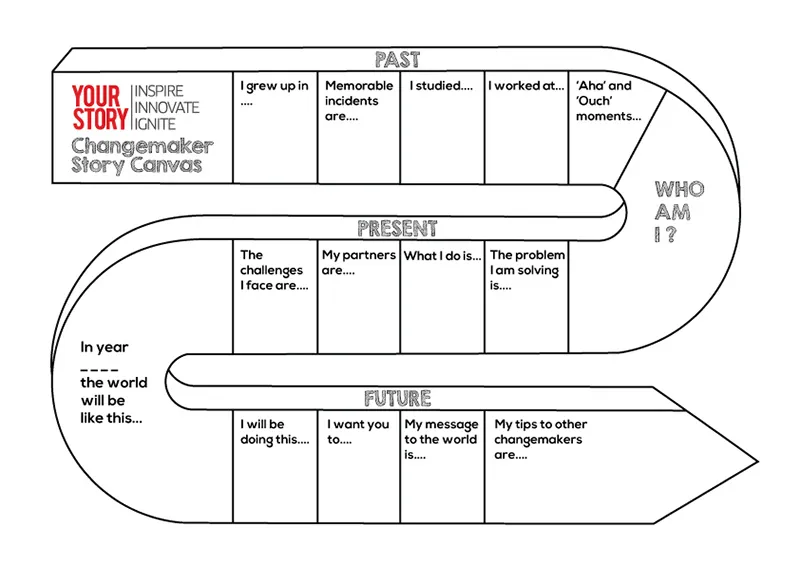Introducing the YourStory Changemaker Story Canvas, a free visualisation tool for startup founders and social entrepreneurs
This is the Era of the Entrepreneur, and the startup movement is spreading around the world as never before, with changemakers embracing for-profit, social enterprise and NGO models of impact.
Numerous useful resources are accessible online for free, such as the Business Model Canvas, Value Proposition Canvas, and Design Thinking Framework. It is also commonly acknowledged that in an era of information overload and shrinking attention span, it is one of the oldest forms of human communication that becomes even more important for entrepreneurs to connect with people: storytelling.
Drawing on extensive research into the field of storytelling and socio-economic impact, as well as YourStory’s own experience in covering more than 21,000 startup stories over the past seven years, we present the ChangeMaker Story Canvas for startup founders, social entrepreneurs, women entrepreneurs, activists and NGO heads. While the business model canvas and value proposition canvas focus more on the business side of entrepreneurship, the Story Canvas focuses on the human and social face of entrepreneurship.

This free visualisation tool for storytellers is inspired by the work of experts such as Annette Simmons,Whitney Johnson, Anjali Sastry,George Bradt and Gillian Davis, and the online resources provided by storytelling coaches like Christian Riedel and Pierre-Yves Sage.Print out the Canvas above (as JPEG or PDF, on an A4-size sheet of paper or larger) or use it on your computer or smartphone, and see how you can map your progress thus far or journey up ahead as a changemaker!
If you are a successful entrepreneur and want to know how to tell your story, this Canvas will help you with the structure. If you are a young aspiring entrepreneur or a mid-career professional looking to branch out and ‘make a dent in the universe,’ this tool will help you structure your inner dialogue.
Harvard professor Howard Gardner has identified eight different types of intelligences for understanding skills and career options, which include intra-personal intelligence: the ability to self-reflect, introspect, map out one’s strengths and weaknesses, and chart a course in life.
To help you with the narrative of your entrepreneurial journey, the ChangeMaker Story Canvas is structured into three parts (the next version will be an interactive tool, based on reader inputs and suggestions):
How,or the past
In this section, you describe where you grew up, what impact your family and community had on you, your first and best friends, your education, and early work experiences. This is not a 'resume' type of listing, but focuses on the 'aha' moments of insights, 'ouch' pain points to solve, and inspirational messages from mentors and influencers. Many of these have a conscious or sub-conscious impact on your attitudes, values and behaviours, and this section of the Canvas helps you understand how you became who you are today.
Who, or the present
In this section, you describe who you are as a person and as a professional. You define the problem area or social cause that you are addressing, what your offerings are in this space, the intended and achieved impacts, who constitutes your team, what challenges you face, and what the naysayers or detractors are saying.
What next, or the future
In this section, you describe your vision of what the world will be like in the future (say year 2020, or even 2050). Within this scenario, where will you and your organisation be, and what do you want your audience to do to achieve this state? Based on your experience so far, what message do you have for the world? And to inspire the next wave of changemakers, what are your tips and checklists of do’s and dont’s for those who may want to chart a similar path?
There is more to this journey than just structure, of course – to tell a powerful story you need to have a compelling vision, elements of drama as you navigate the ups and downs, and proof of tangible impacts in the near term and long term. Emotional components of a good inspiring story are faith, support, adventure, heroism, perseverance, authenticity, humour, suspense, survival of failures, overcoming of conflicts, and maybe even some magic! Other elements come into play depending on whether you choose to write your story or narrate it in audio, video or presentation formats.
Typical story archetypes which grab eyeballs are rags-to-riches tales, David versus Goliath, underdogs who become marvels, me-too adapt-and-paste entrepreneurs who pull it off, small-town entrepreneurs who become billionaires, high school dropouts who change the world, immigrants and refugees who excel in their new lands, super-connectors in cross-industry innovation, successful serial entrepreneurs, social changemakers who overcome bias and discrimination to create a better world, and the banishing of evil and disease for all time.
Now what kind of a changemaker are you?







